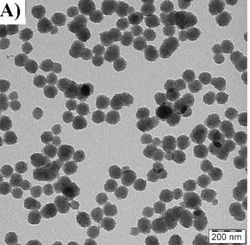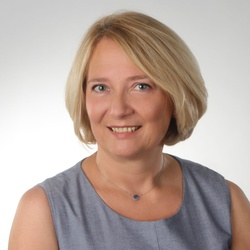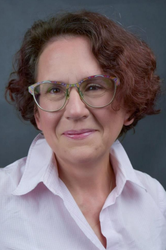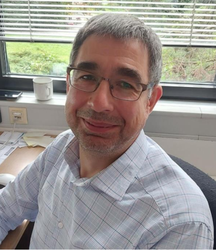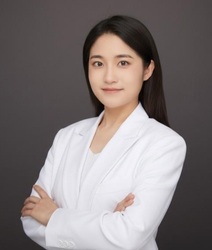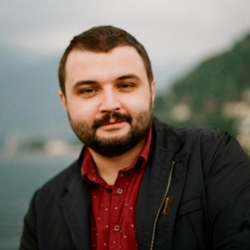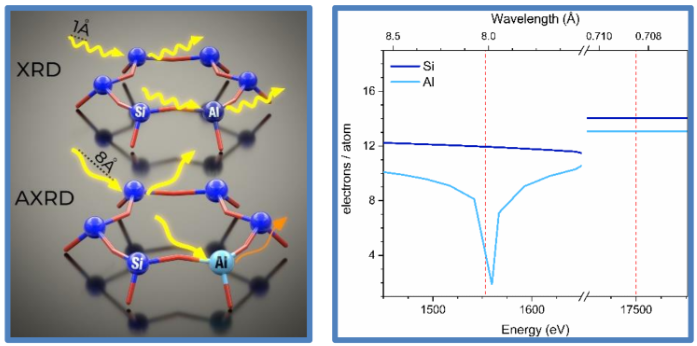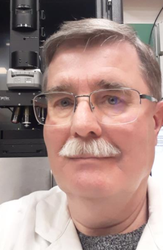Seminars
at the Department of Physical and Macromolecular ChemistryDepartmental Seminars
The Seminars at the Department of Physical and Macromolecular Chemistry are back.
The Seminars will be led by guest speakers, renowned scientists from both domestic and foreign institutions, as well as the Department’s Ph.D. and Master’s students, all presenting unique and engaging topics.
The lectures take place on Wednesdays at 14:00 in lecture room CH3 located in the building of Chemical departments (Hlavova 8, Praha 2).
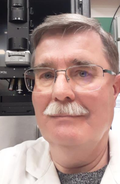
Raman Microscopy of Crystalline Inclusions in Microalgae
by Doc. RNDr., Peter Mojzeš
Raman microscopy is a microscopic imaging method combining the molecular specificity of vibrational spectroscopy with the spatial resolution of confocal optical microscopy. Here, it will be presented as an exceptionally useful method for identifying the chemical nature of intracellular organelles and intracellular inclusions, and for chemical mapping of microorganisms. Recent methodological progress we have contributed to will be illustrated by selected examples of identifying the chemical composition of crystalline inclusions in photosynthetic microalgae. The advantages, perspectives, opportunities, and challenges of wider use of Raman microscopy in biological applications will also be highlighted, along with the limitations and pitfalls of this method.
Lecture Hall CH3, Faculty of Science, Hlavova 8, Praha 2
Feb. 18, 2026 - (14:00 )
Raman microscopy is a microscopic imaging method combining the molecular specificity of vibrational spectroscopy with the spatial resolution of confocal optical microscopy. Here, it will be presented as an exceptionally useful method for identifying the chemical nature of intracellular organelles and intracellular inclusions, and for chemical mapping of microorganisms. Recent methodological progress we have contributed to will be illustrated by selected examples of identifying the chemical composition of crystalline inclusions in photosynthetic microalgae. The advantages, perspectives, opportunities, and challenges of wider use of Raman microscopy in biological applications will also be highlighted, along with the limitations and pitfalls of this method.
Lecture Hall CH3, Faculty of Science, Hlavova 8, Praha 2
Seminar talk by Dr. Chaloupka (nanovlákna)
by Dr., Chaloupka
Lecture Hall CH3, Faculty of Science, Hlavova 8, Praha 2
Dec. 17, 2025 - (14:00 )

Presentations of 2nd year Mgr students
Lecture Hall CH3, Faculty of Science, Hlavova 8, Praha 2
Dec. 10, 2025 - (14:00 )

Presentations of 2nd year Mgr students
Lecture Hall CH3, Faculty of Science, Hlavova 8, Praha 2
Nov. 26, 2025 - (14:00 )
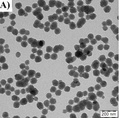
Polymer particles as contrast agents for photoacustic tomography
by Dr., M.Babic
Photoacoustic (PA) imaging detects an acoustic signal induced by light. This unique method provides simultaneously ultrasound anatomical information with high resolution along with a functional photoacoustic signal, which is created by transformation of a laser pulse to mechanical wave by some light absorbing chromophore. PA imaging shows great potential for various clinical procedures from diagnosis to therapy guidance, which arises from its ability to gather functional and molecular information in real-time regime with a high spatial resolution at clinically relevant depths together with the absence of ionizing beaming.
To maximize the contrast effect of the exogenous contrast agents (CA) in the living organism, the optical absorption of the CA should be optimally in the near-infrared (NIR) regions ~700 - 1100 nm and 1200 - 2000. We developed new heterogenous syntheses of polypyrrole (PPY) particles with PA contrast properties in NIR, which allow good control of size (10 nm step within the range 80-300 nm). Besides widely used linear water-soluble polymer stabilizers of the dispersion polymerizations, classical emulsifiers were also successfully employed in their synthesis, what broadens possibilities to employ less hydrophilic comonomers in the aqueous polymerization. Particles as CA for the PA were tested in vitro and in vivo.
Lecture Hall CH3, Faculty of Science, Hlavova 8, Praha 2
Nov. 19, 2025 - (14:00 )
Photoacoustic (PA) imaging detects an acoustic signal induced by light. This unique method provides simultaneously ultrasound anatomical information with high resolution along with a functional photoacoustic signal, which is created by transformation of a laser pulse to mechanical wave by some light absorbing chromophore. PA imaging shows great potential for various clinical procedures from diagnosis to therapy guidance, which arises from its ability to gather functional and molecular information in real-time regime with a high spatial resolution at clinically relevant depths together with the absence of ionizing beaming.
To maximize the contrast effect of the exogenous contrast agents (CA) in the living organism, the optical absorption of the CA should be optimally in the near-infrared (NIR) regions ~700 - 1100 nm and 1200 - 2000. We developed new heterogenous syntheses of polypyrrole (PPY) particles with PA contrast properties in NIR, which allow good control of size (10 nm step within the range 80-300 nm). Besides widely used linear water-soluble polymer stabilizers of the dispersion polymerizations, classical emulsifiers were also successfully employed in their synthesis, what broadens possibilities to employ less hydrophilic comonomers in the aqueous polymerization. Particles as CA for the PA were tested in vitro and in vivo.
Lecture Hall CH3, Faculty of Science, Hlavova 8, Praha 2
Catalysis, medicine and house-of-cards: zeolites and MOFs in action.
by Prof., Barbara Gil
Zeolites and metal-organic frameworks (MOFs) are two important areas of modern porous material research, connecting the fields of catalysis, medicine, and functional design. Their distinctive structures, which range from strong, crystalline networks to the complex, modular structures of MOFs, allow for selective reactivity, molecular sieving, and new bio-interactions. For a long time, zeolites have been the best way to process hydrocarbons, cut down on emissions, and drive acid site-driven transformations in catalysis. MOFs, on the other hand, have customisable pore environments and metal-node functions that expand the substrate scope and catalytic possibilities. New uses for these materials in medicine include targeted drug delivery, imaging, and therapy platforms that take use of their adjustable porosity and biocompatibility. This talk will cover interdisciplinary roles of zeolites and MOFs on the examples of the work done by Zeolite Chemistry Group in Kraków.
Lecture Hall CH3, Faculty of Science, Hlavova 8, Praha 2
Nov. 12, 2025 - (14:00 )
Zeolites and metal-organic frameworks (MOFs) are two important areas of modern porous material research, connecting the fields of catalysis, medicine, and functional design. Their distinctive structures, which range from strong, crystalline networks to the complex, modular structures of MOFs, allow for selective reactivity, molecular sieving, and new bio-interactions. For a long time, zeolites have been the best way to process hydrocarbons, cut down on emissions, and drive acid site-driven transformations in catalysis. MOFs, on the other hand, have customisable pore environments and metal-node functions that expand the substrate scope and catalytic possibilities. New uses for these materials in medicine include targeted drug delivery, imaging, and therapy platforms that take use of their adjustable porosity and biocompatibility. This talk will cover interdisciplinary roles of zeolites and MOFs on the examples of the work done by Zeolite Chemistry Group in Kraków.
Lecture Hall CH3, Faculty of Science, Hlavova 8, Praha 2
UI - počítačová lingvistika
by Dr., N. Peterek
Nov. 5, 2025 - (14:00 )
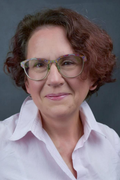
Strengthening the resilience
by Dr., S.Hoskovcová
This seminar explores the concept of resilience as a crucial skill for success and well-being during postgraduate studies. Master’s and PhD programs often present unique challenges -- academic, emotional, and personal --- that test students’ perseverance and adaptability. Through a combination of research insights, practical strategies, and real-life experiences, this session aims to help participants understand the psychological and social factors that foster resilience in demanding academic environments. Attendees will gain information about tools for managing stress, maintaining motivation, balancing competing responsibilities, and developing a sustainable mindset for long-term scholarly and professional growth.
Lecture Hall CH3, Faculty of Science, Hlavova 8, Praha 2
Oct. 29, 2025 - (14:00 )
This seminar explores the concept of resilience as a crucial skill for success and well-being during postgraduate studies. Master’s and PhD programs often present unique challenges -- academic, emotional, and personal --- that test students’ perseverance and adaptability. Through a combination of research insights, practical strategies, and real-life experiences, this session aims to help participants understand the psychological and social factors that foster resilience in demanding academic environments. Attendees will gain information about tools for managing stress, maintaining motivation, balancing competing responsibilities, and developing a sustainable mindset for long-term scholarly and professional growth.
Lecture Hall CH3, Faculty of Science, Hlavova 8, Praha 2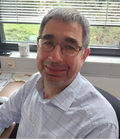
Interpenetrating Epoxy Networks Containing Diels-Alder Type Reversible Covalent Links: Shape-Constant and Self-Healing
by Dr., A.Strachota
Covalent adaptive networks (CAN) are modern polymers, which offer numerous advanced applications, in the form of pure material or as a component, starting with re-processible rigid or rubbery thermostats, through self-healing materials, up to sophisticated programmable shape-memory systems. The development of self-healing materials for electrical insulation is essential for extending both the service life and the reliability of high-voltage components. Hence, in the presented work, novel epoxy resins with temperature-activated self-healing were designed, using the interpenetrating polymer network (IPN) approach. The prepared materials combine a permanently crosslinked epoxy-amine (EP) subnetwork with a thermo-reversible Diels-Alder (DA) subnetwork. The permanent EP structure provides mechanical- and shape stability, while the reversible DA component makes possible nearly complete restoration of properties, after previous fracture followed by healing treatment. The EP network was obtained by reacting diglycidyl ether of bisphenol A (DGEBA) with poly(propylene oxide)-α,ω-diamine (D) with different chain lengths of D, whereas the DA network was formed from a furan-tetra-functionalized derivative of "D" and the diphenylmethane-derived bismaleimide (BMI) and employed the reversible addition of maleimide to furan as the reversible crosslinking mechanism.
Rheological and dynamic-mechanical thermal (DMTA) analyses were employed to find optimal curing protocols, component ratios, and healing conditions. Systems with shortest "D" chains showed the best dielectric performance, while longer "D" minimized the occurrence of side reactions during synthesis and healing. The most promising balance between self-healing efficiency and insulating properties was achieved for the IPN system containing “D” with the size of 400 g/mol. Our results highlight the potential of DA-based IPNs in smart electrical insulation applications.
Lecture Hall CH3, Faculty of Science, Hlavova 8, Praha 2
Oct. 22, 2025 - (14:00 )
Covalent adaptive networks (CAN) are modern polymers, which offer numerous advanced applications, in the form of pure material or as a component, starting with re-processible rigid or rubbery thermostats, through self-healing materials, up to sophisticated programmable shape-memory systems. The development of self-healing materials for electrical insulation is essential for extending both the service life and the reliability of high-voltage components. Hence, in the presented work, novel epoxy resins with temperature-activated self-healing were designed, using the interpenetrating polymer network (IPN) approach. The prepared materials combine a permanently crosslinked epoxy-amine (EP) subnetwork with a thermo-reversible Diels-Alder (DA) subnetwork. The permanent EP structure provides mechanical- and shape stability, while the reversible DA component makes possible nearly complete restoration of properties, after previous fracture followed by healing treatment. The EP network was obtained by reacting diglycidyl ether of bisphenol A (DGEBA) with poly(propylene oxide)-α,ω-diamine (D) with different chain lengths of D, whereas the DA network was formed from a furan-tetra-functionalized derivative of "D" and the diphenylmethane-derived bismaleimide (BMI) and employed the reversible addition of maleimide to furan as the reversible crosslinking mechanism.
Rheological and dynamic-mechanical thermal (DMTA) analyses were employed to find optimal curing protocols, component ratios, and healing conditions. Systems with shortest "D" chains showed the best dielectric performance, while longer "D" minimized the occurrence of side reactions during synthesis and healing. The most promising balance between self-healing efficiency and insulating properties was achieved for the IPN system containing “D” with the size of 400 g/mol. Our results highlight the potential of DA-based IPNs in smart electrical insulation applications.
Lecture Hall CH3, Faculty of Science, Hlavova 8, Praha 2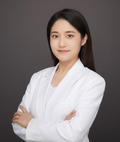
Using Magnetic Fields to Control Transport in Electrochemical Systems
by Ph.D., Rui Gao
We have shown that magnetic fields can be used to increase mass transport in electrochemical systems through magnetohydrodynamic effects (MHD). The Lorentz force acting upon ions moving in the solution generates fluidic convection that enhances mass transport and modifies the observed reactivity. The strength of this fluidic convection non-linearly increases by either: i) decreasing viscosity of the solution or ii) increasing the electrochemical current density. We demonstrated that magnetic fields parallel to the surface of the cathode can help increase mass transport and increase the selectivity for the reduction of CO2 compared to the reduction of protons to hydrogen. Then we demonstrated that magnetic fields can be used to generate complex (i.e., oscillatory) behavior during the electrocatalytic oxidation of glycerol and modified the product distribution. This is attributed to periods of low mass transport during oxidation of glycerol to glycolic acid followed by periods of high mass transport where the glycolic acid moves to the bulk of the solution - preventing further oxidation.
Lecture Hall CH3, Faculty of Science, Hlavova 8, Praha 2
Oct. 15, 2025 - (14:00 )
We have shown that magnetic fields can be used to increase mass transport in electrochemical systems through magnetohydrodynamic effects (MHD). The Lorentz force acting upon ions moving in the solution generates fluidic convection that enhances mass transport and modifies the observed reactivity. The strength of this fluidic convection non-linearly increases by either: i) decreasing viscosity of the solution or ii) increasing the electrochemical current density. We demonstrated that magnetic fields parallel to the surface of the cathode can help increase mass transport and increase the selectivity for the reduction of CO2 compared to the reduction of protons to hydrogen. Then we demonstrated that magnetic fields can be used to generate complex (i.e., oscillatory) behavior during the electrocatalytic oxidation of glycerol and modified the product distribution. This is attributed to periods of low mass transport during oxidation of glycerol to glycolic acid followed by periods of high mass transport where the glycolic acid moves to the bulk of the solution - preventing further oxidation.
Lecture Hall CH3, Faculty of Science, Hlavova 8, Praha 2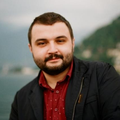
Determining Short- and Long-Range Aluminium Ordering in Zeolite Structures
by Dr., Przemyslaw Rzepka
The short-range order of aluminum atoms within periodic zeolite structures critically influences the presence and behavior of catalytically active centers. In Al-rich zeolites (Si/Al<10), Al-O-Si-O-Al sequences stabilize divalent cations or adjacent acid sites. In Si-rich zeolites (Si/Al > 10), Al atoms
emerge as isolated species, Al pairs (Al(-O-Si-O-)1-2Al), or close Al atoms (Al(-O-Si-O-)3Al). Zeolites with a higher fraction of Al pairs exhibit greater catalytic activity. The local organization of Al atoms is influenced by synthesis conditions, offering a powerful means to tailor zeolite structures for optimizing active centers and fine-tuning catalytic properties. However, no universal method currently exists to directly identify the specific T-sites in a zeolite framework occupied by Al atoms.
Lecture Hall CH3, Faculty of Science, Hlavova 8, Praha 2
Oct. 1, 2025 - (14:00 )
The short-range order of aluminum atoms within periodic zeolite structures critically influences the presence and behavior of catalytically active centers. In Al-rich zeolites (Si/Al<10), Al-O-Si-O-Al sequences stabilize divalent cations or adjacent acid sites. In Si-rich zeolites (Si/Al > 10), Al atoms
emerge as isolated species, Al pairs (Al(-O-Si-O-)1-2Al), or close Al atoms (Al(-O-Si-O-)3Al). Zeolites with a higher fraction of Al pairs exhibit greater catalytic activity. The local organization of Al atoms is influenced by synthesis conditions, offering a powerful means to tailor zeolite structures for optimizing active centers and fine-tuning catalytic properties. However, no universal method currently exists to directly identify the specific T-sites in a zeolite framework occupied by Al atoms.
